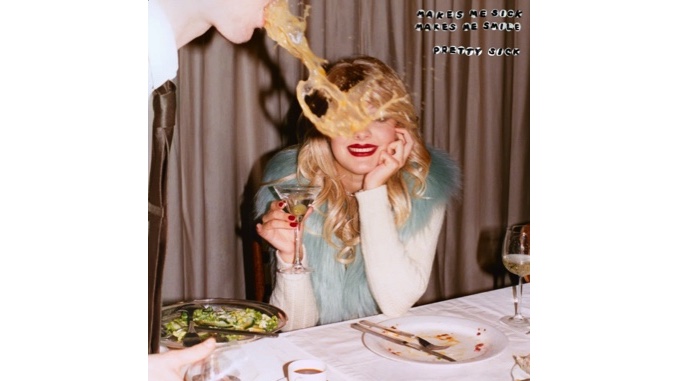Pretty Sick Isn’t Sure If It’s True Love or a Toxic Relationship on Makes Me Sick Makes Me Smile
The debut album from the London-based, New York City-bred band highlights the space in between reconciliation and relinquishing a relationship you’ve outgrown

Pretty Sick (Sabrina Fuentes) isn’t afraid to admit she’s a little caught in between a lot of things. Somewhere between missing her hometown of New York City and embracing her new life in London, between true love and a toxic relationship, between sobering up and spending one more night at her usual dive bar, between letting go and holding on despite her knuckles turning white from the strain. On Makes Me Sick Makes Me Smile, out now on Dirty Hit, Fuentes embraces all of the contradictions and confusion of wanting to say it’s alright, but knowing you should probably be saying goodbye.
Amidst a heavy dose of grungy ‘90s nostalgia, Makes Me Sick Makes Me Smile allows Fuentes to pull at the threads of the web of feelings she started to spin on 2020’s Deep Divine and 2021’s Come Down. Still stuck, she isn’t trying to find the line between obsession and desire, or self-sacrifice and self-sabotage. She isn’t trying to make sense of these shattering emotions, and isn’t in the mood to compartmentalize them, or cut herself off from the crossed wires of devotion and deception. She’s content to just own them.
Whether it’s the soft strings on “Black Tar,” or the Bikini Kill-inspired riffs on “Heaven,” Makes Me Sick Makes Me Smile is able to tap into a visceral pain that hurts the same no matter how Fuentes delivers it. The fact that she can access this longing and devastation in so many ways makes the album even more poignant. It makes her ambivalence feel ubiquitous—despite pounding percussion and blown-out basslines, there’s no way around it.
This suffocating sense lends itself to 12 heavy-handed tracks that bring an intensity only matched by Fuentes’s crushing confessionals. She twists the knife with lyrics like, “If you think I’m pretty I can be real easy / Cause I miss him with my whole chest / That’s the way it’s always been,” that she pairs with somber violins on “Self Fulfilling Prophecy.” Other times, it’s the desperate shouts she dissolves into, like on “Drunk,” that express her undying urgency. At her most vulnerable, she uses her opaque, post-punk-like armor to protect her most fragile feelings and delicate admissions.
-

-

-

-

-

-

-

-

-

-

-

-

-

-

-

-

-

-

-

-

-

-

-

-

-

-

-

-

-

-

-

-

-

-

-

-

-

-

-

-








































